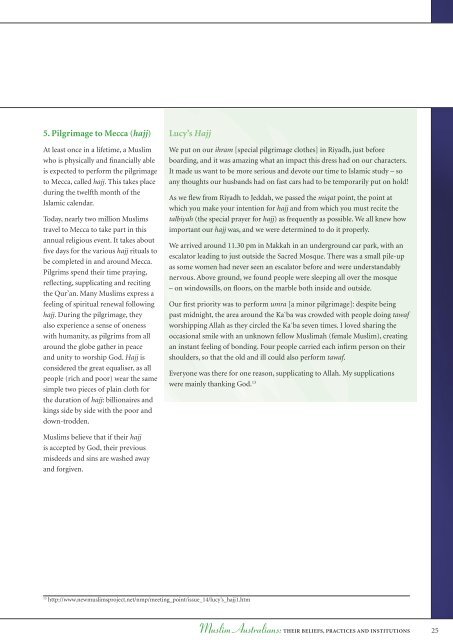Muslim Australians - Religion Cultural Diversity Resource Manual
http://www.islamicglobe.com
http://www.islamicglobe.com
You also want an ePaper? Increase the reach of your titles
YUMPU automatically turns print PDFs into web optimized ePapers that Google loves.
5. Pilgrimage to Mecca (hajj)<br />
At least once in a lifetime, a <strong>Muslim</strong><br />
who is physically and financially able<br />
is expected to perform the pilgrimage<br />
to Mecca, called hajj. This takes place<br />
during the twelfth month of the<br />
Islamic calendar.<br />
Today, nearly two million <strong>Muslim</strong>s<br />
travel to Mecca to take part in this<br />
annual religious event. It takes about<br />
five days for the various hajj rituals to<br />
be completed in and around Mecca.<br />
Pilgrims spend their time praying,<br />
reflecting, supplicating and reciting<br />
the Qur’an. Many <strong>Muslim</strong>s express a<br />
feeling of spiritual renewal following<br />
hajj. During the pilgrimage, they<br />
also experience a sense of oneness<br />
with humanity, as pilgrims from all<br />
around the globe gather in peace<br />
and unity to worship God. Hajj is<br />
considered the great equaliser, as all<br />
people (rich and poor) wear the same<br />
simple two pieces of plain cloth for<br />
the duration of hajj: billionaires and<br />
kings side by side with the poor and<br />
down-trodden.<br />
Lucy’s Hajj<br />
We put on our ihram [special pilgrimage clothes] in Riyadh, just before<br />
boarding, and it was amazing what an impact this dress had on our characters.<br />
It made us want to be more serious and devote our time to Islamic study – so<br />
any thoughts our husbands had on fast cars had to be temporarily put on hold!<br />
As we flew from Riyadh to Jeddah, we passed the miqat point, the point at<br />
which you make your intention for hajj and from which you must recite the<br />
talbiyah (the special prayer for hajj) as frequently as possible. We all knew how<br />
important our hajj was, and we were determined to do it properly.<br />
We arrived around 11.30 pm in Makkah in an underground car park, with an<br />
escalator leading to just outside the Sacred Mosque. There was a small pile-up<br />
as some women had never seen an escalator before and were understandably<br />
nervous. Above ground, we found people were sleeping all over the mosque<br />
– on windowsills, on floors, on the marble both inside and outside.<br />
Our first priority was to perform umra [a minor pilgrimage]: despite being<br />
past midnight, the area around the Ka`ba was crowded with people doing tawaf<br />
worshipping Allah as they circled the Ka`ba seven times. I loved sharing the<br />
occasional smile with an unknown fellow <strong>Muslim</strong>ah (female <strong>Muslim</strong>), creating<br />
an instant feeling of bonding. Four people carried each infirm person on their<br />
shoulders, so that the old and ill could also perform tawaf.<br />
Everyone was there for one reason, supplicating to Allah. My supplications<br />
were mainly thanking God. 13<br />
<strong>Muslim</strong>s believe that if their hajj<br />
is accepted by God, their previous<br />
misdeeds and sins are washed away<br />
and forgiven.<br />
13<br />
http://www.newmuslimsproject.net/nmp/meeting_point/issue_14/lucy’s_hajj1.htm<br />
<strong>Muslim</strong> <strong>Australians</strong>:THEIR BELIEFS, PRACTICES AND INSTITUTIONS 25














